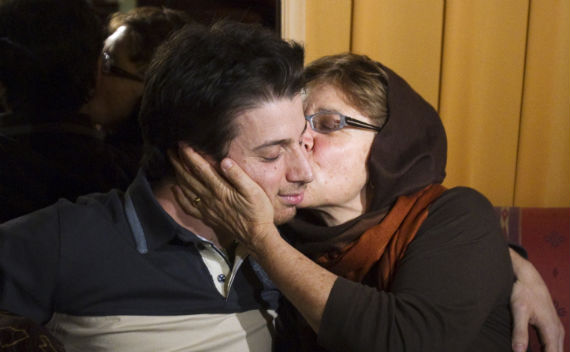The Invisible Hostage Crises
More on:

It is now a year and a half since Iran jailed three American hikers on trumped-up spying charges. The three, Shane Bauer, his fiancée Sarah Shourd, and Josh Fattal were detained on July 31, 2009; Shourd was released on September 14 of last year. Recalling the hostage crisis that helped bring down Jimmy Carter in 1980 and that ended on the twentieth of January thirty years ago, it is striking that the administration appears only mildly disturbed that they continue to sit in jail—as does Congress.
Nor are Bauer and Fattal the only American hostages. The USAID contractor Alan Gross has been imprisoned in Cuba for 13 months now. He was there to help the tiny Cuba Jewish community connect with Jewish communities around the world, and for this "crime" he is accused of espionage. If that verdict of administration indifference seems too harsh, it is striking that the administration just two weeks ago announced a loosening of travel restrictions to Cuba whose goals include to "enhance contact with the Cuban people and support civil society through purposeful travel, including religious, cultural, and educational travel" and especially to "Allow religious organizations to sponsor religious travel to Cuba." To encourage contact with religious communities in Cuba while the last guy who tried remains in jail does not suggest that Mr. Gross’s release is at the top of the Administration’s agenda.
Perhaps there is a secret deal here, and he will be released within days. But if there was no agreement of any kind, the administration’s move seems callous. According to the Washington Post, "The new regulations had been drawn up by Obama administration officials last summer. But, wary of political fallout, they had held off introducing them until after the November elections. Another complicating factor has been the detention of Alan P. Gross, a Potomac contractor who was arrested in Havana in December 2009...." The question is precisely whether Mr. Gross is regarded as an American whose freedom should be our top priority, or a "complicating factor" in the administration’s drive to liberalize travel to Cuba. Even if that were a worthy goal, it is difficult to see why it is a more vital national interest than freeing our citizens.
As to those held in Iran, is it not fair to ask how far we will go to free them? No doubt the administration has reached out to many interlocutors it believes capable of persuading the ayatollahs: Switzerland (which represents us in Iran), Russia, China, Turkey and who knows how many others. And it was quite sensible initially to believe that quiet diplomacy was more likely to free the two men than loud pressure.
Except it isn’t working. Appropriate holidays for “humanitarian” releases have come and gone, and then come and gone again. Those of a historical bent may think back to “Perdicaris Alive or Raisuli Dead,” the battle cry Theodore Roosevelt used in 1904 during his campaign that year, and wonder whether something more forceful would work better. That is debatable; what cannot be debated is that Iran has felt itself able to imprison innocent Americans endlessly without worrying about the consequences.
It’s worth noting that two Germans are imprisoned as well, although “only” since this past October—and they were newspaper reporters, not hikers who wandered into harm’s way. Still, German society has reacted far more than our own: German media are campaigning for them, and on January 2 over a hundred German leaders appealed publicly for their release. The list included the Foreign, Finance, and Defense ministers, plus the heads of Deutsche Bank, Deutsche Telekom, Daimler—and even Boris Becker, the retired tennis star. The appeal is unlikely to do much good in Tehran, but it does show that the imprisonment is not being forgotten.
Thinking of the Americans in prison in Iran, at what point do we as a nation say “enough?” I hope we have conveyed to the regime that if a hair on their heads is injured, there will be hell to pay—immediately. Should we go further right now, and tell the ayatollahs to let them go by a date certain or suffer some sanction? Bluffing would be counterproductive, so if we make that statement we must follow through with a blow to some Iranian asset.
The arguments against any such move are substantial. Perhaps our negotiations on Iran’s nuclear program would be damaged (a weighty argument only if you think they are leading anywhere good). Perhaps Iran would “over-react” and act against the two men, for example by convicting them of espionage and sentencing them to long terms, leading us to need to take additional action. It’s dangerous, to be sure.
But on the other side of the scale, we are paying a price by acting as if we were Belgium or Costa Rica, unable to do more than wring our hands and plead. We are reducing respect for the United States in a capital where the level of respect matters, Tehran. We are allowing two fellow citizens to be used as human sacrifices by an odious regime that puts no value on human life, and pays little price for doing so. We are behaving as if we were powerless, and as we do so we persuade others that perhaps we are.
Although we are not at war with Iran its rulers have been killing Americans for a very long time—in terrorist attacks and more recently in Iraq and Afghanistan. Perhaps they would take us more seriously in the future, in ways that would even help our diplomatic negotiations with Iran, if we now imposed a penalty on the regime. Or would it be OK to see Mr. Fattal and Mr. Bauer sit in prison for their second anniversary, and then their third?
More on:
 Online Store
Online Store